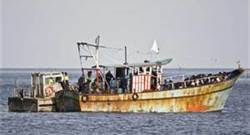Do Not Ask Why the Sea Has Forsaken You
It was a rough five days on and under the seas last week. On June 14th, an overloaded fishing boat full of mostly Syrian, Egyptian and Pakistani migrants sank fifty miles off the coast of Greece. Eighty-two people drowned and more than five hundred people are “missing.” Five days later, on June 18th, a submersible imploded in the North Atlantic on its way down to view the wreck of the Titanic. Five men died. Did I say men? I meant five men and a boy.
Though the differences between the tragedies are obvious, it’s hard not to reflect upon the similarities.
Neither event occurred as the result of poor weather, but rather from the greed and bad decisions of men. The immediate reason the migrant boat sank was because 750 people were crammed into a boat with a capacity of 50. The Greek Coastguard has been blamed for capsizing the boat as it tried to tow it, but the more likely scenario is that they wouldn’t do anything until it was too late. The larger reason that nearly six hundred men, women and children lost their lives is that the conditions in their home countries were so intolerable that they were willing to chance the perils of the Mediterranean to get somewhere where life might be better.
Whereas Pakistani traffickers and Egyptian smugglers are responsible for overloading a boat that they knew could very likely not make it to Italy, the Egyptian, Pakistani and Syrian governments are responsible for the conditions that force desperate people to go. The international community also needs to self-reflect. What have we tolerated? What actions have we not taken that might have made life bearable enough for people to stay home?
The immediate reason the submersible Titan imploded now seems almost certainly due to a catastrophic materials failure. The larger reason it imploded is the complete lack of regulation of a niche industry that caters to the super rich. Oceangate, the company that developed and operated the submersible, used materials that allowed them to fabricate a bigger pressure chamber. A bigger pressure chamber meant more passengers and higher profits. Stockton Rush, the CEO of Oceangate, repeatedly brushed aside suggestions that these materials were flawed.
If someone does decide to begin regulating the “adventure” submersible industry, may I suggest that after they insist on standards-based protocols for materials testing, they also think about a minimum age requirement for passengers and a ban on companies taking down multiple members of the same family.
The most tragic similarity of the two events is that all of the passengers purchased their own deaths. The migrants purchased theirs at great cost, using all of their savings, or taking loans from family members, or taking loans from other less scrupulous lenders with complicated arrangements to pay the money back. For the four passengers on the submersible, it would seem that the fee of $250,000 was a mere drop in the bucket to the fortunes that they enjoyed.
All the travelers knew they might not make it. The migrants were so desperate they felt they had to chance it; the passengers in the Titan signed waivers, but did they believe them?
The differences remain painful and instructive. Desperate Migrants vs. Wealthy Adventurers. World Indifference vs. Rescue Spectacle.
But what about the differences in our hearts?
Did you lose sleep over another migrant vessel capsizing in the Mediterranean? Because I didn’t. Maybe it was because it had happened so many times before. Maybe it was because I have grown numb even though I don’t want to and I know I shouldn’t. The tragedy of the submersible was different. I did have trouble sleeping the night we believed that the Titan’s oxygen supply was dwindling. It seemed too ghastly a fate, even for spoiled rich guys, sitting at the bottom of the Atlantic, struggling to take their last breath.
As we’ve since learned, the four men and a boy in the Titan didn’t suffer through five days of dwindling air. They didn’t suffer at all. But did they know? Did the faulty material start to crack and boom just before it went? Did the man who had believed that it would hold have enough time to turn to face his passengers? Did the father of a nineteen-year-old boy have time to reflect upon the future his son was about to lose?
On March 27, 1980, a semi-submersible drilling rig being used as a dormitory for oil workers went over in bad weather. Its stabilizing cables snapped and one-hundred-and-twenty-three men of the two hundred on board perished in the cold and the dark. Most of these men were Norwegians from the city of Stavanger or its environs. They were not trying to run away from anything or to notch one more adventure on their tally pole. They were trying to make a living.
The rig that went over was operated by the Stavanger Drilling Company and named for a native son of that city: Alexander Kielland. In the Stavanger Oil Museum there is a video you can watch about the disaster which will make your heart contract and your hair stand on end. Its epigraph is a line from Kielland, a nineteenth-century Norwegian writer.
Do not ask why the sea has forsaken you, for she has promised you nothing.
Not a better life, not a decent living, not another extreme adventure.
The sea is the sea. She cares not for the fates and follies of humans.







Very powerful piece Linda. Thank you. I hadn’t thought about the migrants and the submarine occupants ‘paying’ for their own deaths. Sad all the way around.
Utterly gut-wrenching.
Thank you Linda. Another great article. I was also saddened by the five people who lost their lives in Ocean Gate submersible. I was especially sad for the young man whose future was cut short due the many construction safety warnings which were not heeded.
So many things not heeded. Yet now that this has happened, so many people saying that they had doubts about safety issues. Ugh.
Great differences in these two tragedies. The migrant boat was filled with people so desperate that they went into a knowningly risky situation clinging to the hope that their lives might go from intolerable to something on which to build a future.
The Titan’s passengers were men of extreme privilege who were well able to research the risks they were taking, and well able to pay the ticket price of $250,000. Others passed up invitations to participate, having considered the stats. One of the passengers took his son with him — stunningly ill-considered. There was available evidence that this vessel was insufficiently tested; doubts as to its ability to withstand the pressure had already been raised. They could have thought about how it would be, cramped together in a space smaller than a minivan, with the only window at the rear of the capsule in the toilet (screened from the passengers by a curtain);. with their only view of the ocean depths via a screen.
Minimal effort went into saving the migrant boat’s passengers. The Titan’s disappearance however garnered the maximum effort — planes, helicopters, ships, paid for by Canada; the United States and other countries. Of course vast amounts of fossil fuels were burned in the effort.
When people undertake rash adventures rescue operations are called upon, often causing further loss of life. Everyone, not just the immediate families, bear the brunt. Extreme adventure travel has become the latest extravagance of the super rich. Tragic as it was, I hope this incidence serves as a warning.
One certainly hopes that people will be more sensible in the future, but something tells me there will still be plenty of people who are prepared to risk their necks for kicks. While so many others have no choice.
Excellent, Linda! Sad, sad, sad .
Yes, very sad.